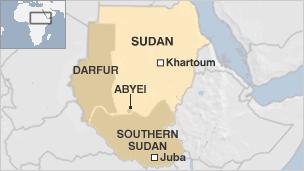George Clooney call to freeze Sudan leader's assets
- Published
George Clooney, a UN messenger of peace, has just returned from Sudan
US actor George Clooney has called for the freezing of assets held by Sudan's President Omar al-Bashir.
The Sudanese leader is wanted by the International Criminal Court for war crimes in Darfur - charges he denies.
Mr Clooney told the BBC that freezing his bank accounts would be a good way of putting pressure on Khartoum.
The Hollywood star - a UN messenger of peace - has just returned from a private visit to Sudan ahead of January's referendum on secession for the south.
The vote was part of a 2005 peace deal to end the two-decade north-south civil war - separate from the ongoing conflict in Darfur in the west of Sudan.
There has been growing international concern that the referendum could be delayed, sparking renewed violence.
'Inconsistent'
The aim of Mr Clooney's trip was to push the US government to take measures to prevent a new cycle of violence in Sudan.

After meeting US President Barack Obama this week on his return from Sudan, Mr Clooney said the international community had been inconsistent in its dealings with the Sudanese leadership.
"Real diplomacy, robust real diplomacy means you get the British, the French, everybody together," he told BBC Arabic.
He also said other Arab states should get more involved.
"It would be nice to have as much involvement as we could from an Arab state. It would make a very big difference in the negotiating and Egypt is certainly a huge player in this."
Mr Clooney, who spent several years trying to raise awareness on the situation in Darfur, urged all countries to close ranks.
"Bashir isn't saving his money in Sudanese pounds, you know. They are in euros or they are in English pounds or they are in dollars. They are somewhere," he said.
"We should be freezing those assets, if you really want to deal with it, if you really want to put pressure on them."
An estimated 1.5 million people died in the civil war between the mainly Muslim north and Christian and Animist south.
The UN estimates the six-year conflict in Darfur has cost the lives of 300,000 people and driven a further 2.7m from their homes.
The government puts the death toll at 10,000 and has said the problems in Darfur have been exaggerated for political reasons.